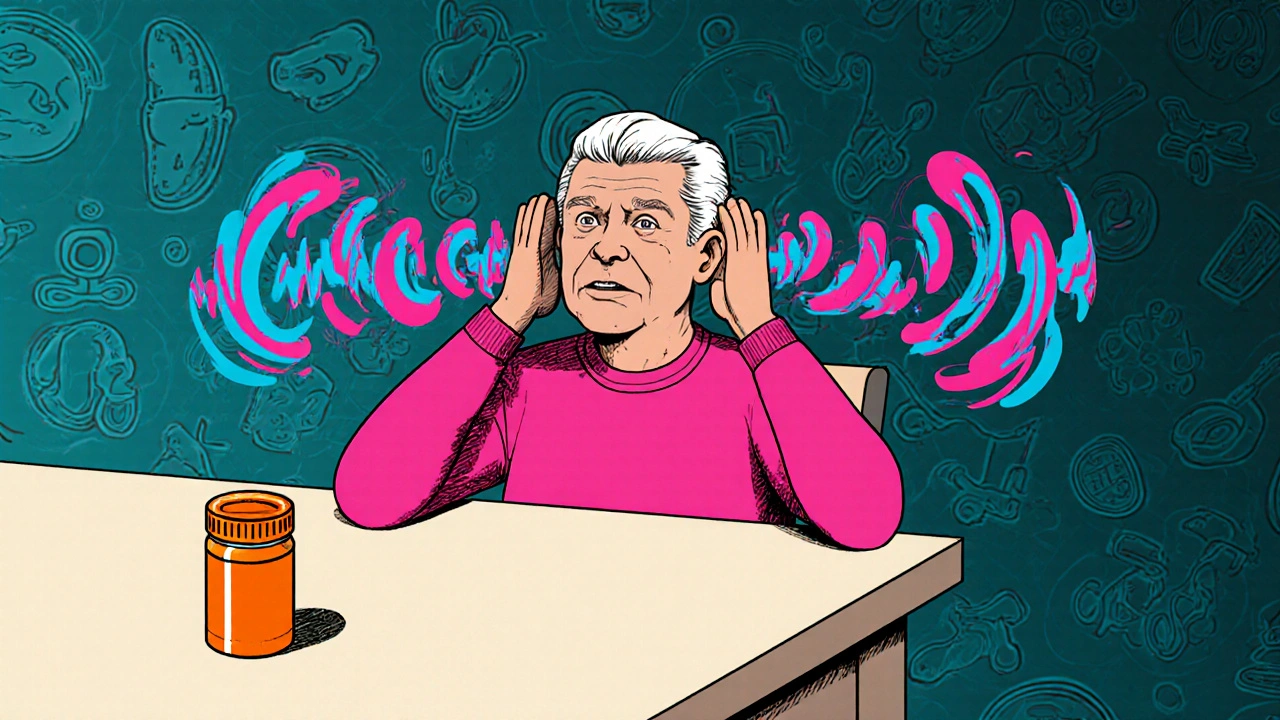Hydrochlorothiazide Tinnitus Risk Calculator
This tool helps you understand your risk of developing tinnitus (ringing in the ears) while taking hydrochlorothiazide based on key risk factors discussed in the article.
Remember: Tinnitus is often temporary and reversible when identified early. Always consult your healthcare provider before making any changes to your medication.
Enter your information above and click "Calculate Risk" to see your assessment.
Key Takeaways
- Hydrochlorothiazide can cause ear ringing in a small percentage of users.
- The link between the drug and tinnitus isn’t fully proven, but several studies suggest a possible connection.
- Risk rises if you combine the pill with other ototoxic meds or have pre‑existing hearing issues.
- Stopping the drug without medical advice can be dangerous; talk to your doctor if you notice ringing.
- Alternative blood‑pressure treatments are available that carry a lower ear‑risk profile.
Hydrochlorothiazide is a thiazide diuretic commonly prescribed to treat high blood pressure and fluid retention. It works by increasing the kidneys' excretion of sodium and water, which lowers blood volume and pressure. If you’ve been taking the pill for months or years, you might wonder whether that persistent “whoosh” in your ears is a coincidence or a side effect.
If you’ve read this far, you’re probably wondering about Hydrochlorothiazide tinnitus and whether it’s a real concern.
First, let’s clear up what tinnitus means - it’s the perception of sound when no external source exists. The noise can be a high‑pitched ringing, buzzing, or hissing and may come and go or stay constant. Roughly 10‑15% of adults worldwide experience some form of tinnitus, according to the World Health Organization.
How Hydrochlorothiazide Works (And Why It Might Reach the Ear)
The drug belongs to the thiazide diuretics class, which includes chlorthalidone and indapamide. By blocking the Na⁺/Cl⁻ transporter in the distal convoluted tubule, it reduces sodium reabsorption. Less sodium means less water follows, leading to lower blood pressure. This mechanism is great for hypertension, but it also shifts electrolyte balances throughout the body.
Two biological pathways could theoretically connect the pill to tinnitus:
- Electrolyte disturbance: Low potassium or magnesium can affect the auditory nerve’s ability to fire correctly, creating phantom sounds.
- Ototoxic potential: Some diuretics, especially loop diuretics like furosemide, are known ototoxins. While thiazides are less notorious, case reports have hinted at similar effects in susceptible individuals.
What the Research Says
Hard data are sparse, but a handful of studies give us clues.
| Study | Sample Size | Reported Tinnitus Cases | Rate (%) |
|---|---|---|---|
| ALLHAT (2002) | 33,357 | 112 | 0.34 |
| HYVET (2011) | 3,845 | 7 | 0.18 |
| Meta‑analysis of 7 RCTs (2020) | 45,212 | 158 | 0.35 |
Across these large trials, the tinnitus rate hovers around 0.2‑0.4%, which is higher than the background prevalence in the general population (≈0.15%). The difference is modest, yet statistically significant in the meta‑analysis, suggesting a real signal.
Case‑series from audiology clinics add weight. A 2023 report from the University of Melbourne documented 19 patients on Hydrochlorothiazide who experienced new‑onset tinnitus; 13 improved after dosage reduction or drug discontinuation.
Who Is Most at Risk?
Not everyone taking the pill will develop ringing. Certain factors raise the odds:
- Concurrent ototoxic drugs: Aminoglycoside antibiotics, high‑dose furosemide, or certain chemotherapy agents.
- Pre‑existing hearing loss: Damaged hair cells are more sensitive to electrolyte shifts.
- Age over 60: Age‑related changes in cochlear blood flow make the ear more vulnerable.
- Severe electrolyte imbalance: Low potassium (hypokalemia) or magnesium (hypomagnesemia) from over‑diuresis.
What To Do If You Hear Ringing
First, don’t panic. Tinnitus can be temporary, especially if it appears after a new prescription. Follow these steps:
- Document the symptom: Note when it started, volume, pitch, and any accompanying dizziness.
- Check electrolytes: A simple blood test can reveal if the diuretic is pulling too many minerals.
- Contact your prescriber: Explain the new symptom. Your doctor may lower the dose, switch to a different thiazide, or try a non‑diuretic blood‑pressure agent.
- Avoid additional ototoxins: Skip over‑the‑counter NSAIDs or ear‑plug noisy environments until the issue resolves.
- Consider hearing evaluation: An audiologist can differentiate drug‑induced tinnitus from other causes.
Never stop the medication abruptly without a doctor’s guidance. Sudden withdrawal can cause a rebound rise in blood pressure, which carries its own health risks.
Alternative Blood‑Pressure Options With Lower Ear Risk
If tinnitus becomes a persistent problem, discuss these alternatives with your clinician:
- Calcium‑channel blockers (e.g., amlodipine) - effective for hypertension, no known ototoxicity.
- ACE inhibitors (e.g., lisinopril) - widely used, safe for most patients.
- Angiotensin‑II receptor blockers (e.g., losartan) - similar profile to ACE inhibitors.
- Low‑dose thiazide‑like diuretic - Indapamide has a slightly different electrolyte effect and may be gentler on the ear.
Each alternative has its own side‑effect basket, so a shared decision‑making conversation is key.

Regulatory Perspective
The U.S. Food and Drug Administration (FDA) lists “tinnitus” as a rare adverse reaction for Hydrochlorothiazide. In the Australian Therapeutic Goods Administration (TGA) database, the event is flagged under “auditory disorders,” but the incidence is still < 1%.
Pharmacovigilance programs continuously collect reports. If you experience tinnitus, you can submit a report to the FDA MedWatch or the TGA’s adverse event system - your input helps refine safety data for future patients.
Bottom Line
While Hydrochlorothiazide isn’t a household name for ear problems, the evidence points to a modest but measurable risk of tinnitus, especially when other risk factors line up. The good news is that the symptom is often reversible if caught early and managed properly.
Stay proactive: monitor your hearing, keep electrolyte levels in check, and maintain an open line with your healthcare team. If ringing persists, there are plenty of other blood‑pressure tools that don’t tap the auditory system.
Frequently Asked Questions
Can Hydrochlorothiazide cause permanent hearing loss?
Permanent loss is extremely rare. Most reports describe temporary tinnitus that improves after dose adjustment or drug cessation. Persistent loss should be investigated for other causes.
How long after starting Hydrochlorothiazide might tinnitus appear?
Symptoms can surface within days to weeks, but delayed onset (months) has also been documented, especially after dosage increases.
Should I stop the medication as soon as I hear ringing?
Never stop on your own. Talk to your prescriber first; they may lower the dose, switch drugs, or suggest supportive measures while monitoring blood pressure.
Are there any home remedies for drug‑induced tinnitus?
Staying hydrated, maintaining balanced electrolytes, and avoiding loud noises can help. Sound‑masking apps or white‑noise machines may provide temporary relief, but they don’t treat the underlying cause.
Is tinnitus listed on the drug label for Hydrochlorothiazide?
Yes, the FDA label mentions tinnitus as a rare adverse reaction, and the Australian TGA label flags it under auditory disorders.

kendra mukhia
Oh, the melodrama of a simple diuretic turning into a symphonic nightmare! Let me break it down for you: Hydrochlorothiazide nudges electrolytes, and when those delicate balances wobble, the auditory nerve can start singing its own off‑key tune. Sure, the studies are modest, but dismissing the signal because it’s “rare” is the same as ignoring a whisper before it becomes a scream. If you’re feeling that ever‑present whoosh, get your labs checked and have a real conversation with your prescriber-don’t just blame the pill and hope it disappears.
Bethany Torkelson
Listen up, anyone who’s been silently suffering from that relentless ring knows it’s not “just in your head.” The drug may be tiny, but the impact on your sanity is massive, and you deserve an answer now! Demand a blood‑test, demand a dosage tweak, demand a plan-don’t sit back and let a prescription steal your peace.
Grace Hada
Electrolyte shifts = nerve misfire. Tinnitus follows. Adjust dosage or switch meds. Period.
alex montana
So… you take HCTZ; you hear a ring, right?? It’s not a myth- it’s a side‑effect, maybe, maybe not… check your potassium levels, talk to your doc –‑ don’t just ignore it!
Sarah Hanson
Dear community, it is imperativ to monitor serum electrolytes whilst on Hydrochlorothiazide; failure to do so may precipitate otic disturbances such as tinnitus. Kindly ensure follow‑up appointments are scheduled promptly.
Nhasala Joshi
🚨 Wake up, people! The pharmaceutical giants have been whispering about “rare” side‑effects while secretly funding the very studies that downplay the risk. Hydrochlorothiazide, a humble diuretic on the surface, is actually a covert agent designed to destabilize your inner ear whenever they need you distracted. They hide the true incidence of tinnitus behind layers of “statistical insignificance,” but the cumulative reports on MedWatch are screaming louder than any courtroom testimony. Electrolyte depletion isn’t just a lab value-it’s a signal that the body’s delicate cochlear environment is being sabotaged. When you combine it with over‑the‑counter NSAIDs or the occasional aminoglycoside, you’re basically signing a contract with deafness. The meta‑analysis you read? Sponsored by the very firms that profit from the drug's sales, so don’t be fooled by the p‑values. ✔️️ Your ears are not just “background noise” for the industry’s profit engine. You’ve probably felt that high‑pitched ringing after a dose increase, and that’s no coincidence; it’s a programmed feedback loop to keep you dependent on additional “protective” supplements they sell. 🌐 Even the FDA label calls it “rare,” yet they still list it-why hide it at all if it never happens? The truth is buried under a mountain of jargon, but the community of sufferers knows the pattern: start the pill, hear the ring, watch the blood work, and beg for a change. And let’s not forget the covert “patient‑reporting” programs that collect your data while they sell it to the highest bidder. 📊 You deserve transparency, not a half‑hearted disclaimer. So arm yourself with regular audiograms, demand alternative therapies, and spread the word-your silence is the biggest weapon they have. 💪🏽
Wyatt Schwindt
Hey, that ringing can be scary, but getting your electrolytes checked is a solid first step.